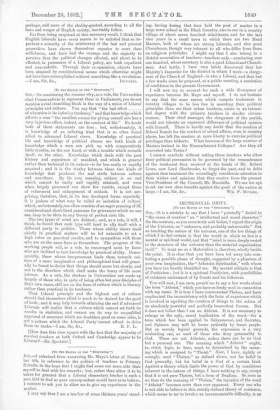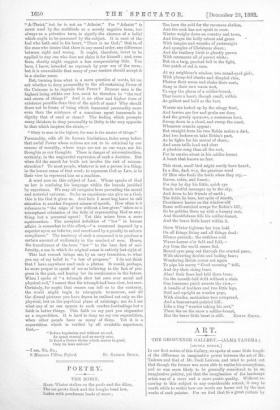IMPERSONAL DEITY.
LTD THE EDITOR OF THE "SPECTATOR,"]
Sra,—It is a mistake to say that I have " pointedly " denied to "the cause of creation" an "intellectual and moral character." On the contrary, as you more truly said before, I regard the origin of the Universe, as "unknown, and probably unknowable." But as touching the nature of the universe, one of the few things of which I do feel certain is that the world in which we live is a mental or spiritual world, and that "mind is more deeply rooted in the structure of the universe than the material organisation itself." To treat me as a Materialist is, therefore, wholly beside the point. It is clear that you have been led away into com- bating a possible phase of thought, suggested by a phantom of your own imagination, the." Atheistic Spiritualist," with whom you have too hastily identified me. My mental attitude is that of Positivism ; but it is a spiritual Positivism, with possibilities of existence undreamed of by Comte and his followers.
You will now, I am sure, permit me to say a few words about the term "Atheist," which you have so freely used in connection with my name. It is true I have controverted Theism, and have emphasised. the inconsistency with the facts of experience which is involved in atteribing the creation of things to the action of an absolutely powerful and perfectly benevolent Person. But it does not follow that I am an Atheist.. It is not necessary to enlarge on the ugly, moral implication of the word,—for term which has been applied to Sakyamouni, and Socrates, and Spinoza may well be borne patiently by lesser people. But on merely logical grounds, the expression is a very misleading one, as used of those who deny personality to God. These are not Atheists, unless there can be no God but a personal one. The meaning which " Atheist " ought, in, strict logic, to bear, must be determined by the mean- ing which is assigned to "Theist." Now, I have, rightly or wrongly, used "Theism;" as defined above, not for belief in God generally, but for belief in a God of a certain kind. Against a theory which limits the power of Goa by conditions inherent in the nature of things, I have nothing to say, except that it is not pure Theism, but a form of Dualism. So soon as we thus fix the meaning of "Theism," the injustice of the word " Atheist " becomes more than ever apparent. Every one who is not able to believe in this strictly-defined theory of existence, which seems to me to involve an insurmountable difficulty, is an
"A-Theist," but he is not an "Atheist." For "Atheist" is never used by the multitude as a merely negative term, but always as a privative term, to signify the absence of a belief which ought to be possessed by the subject. It is used of the fool who hath said in his heart, "There is no God;" that is, of the man who denies that there is any moral order, any difference between right and wrong. It ought, therefore, never to be applied to any one who does not claim it for himself ; and, even then, charity might suggest a less compromising title. You have, I know, intended no reproach by your use of the term; but it is unavoidable that many of your readers should accept it in a similar sense.
But, turning from what is a mere question of words, let me ask whether to deny personality to the all-sustaining Power of the Universe is to degrade that Power? Because man is the highest being within. our ken, must he therefore be "the roof and. crown of things ?" And is no other and higher form of existence possible than that of the spirit of man ? Why should there not be forms of being which transcend personality more even than the existence of a conscious agent transcends in dignity that of sand or stone ? The feeling which prompts many thinkers to deny personality to Deity is the very opposite to that which inspires the strain,— " Glory to man in the highest, for man is the master of things."
Personality, with all its human limitations, fades away before that awful Power whose actions are not to be criticised by our canons of morality, whose ways are not as our ways, nor his thoughts as our thoughts. There is danger of misconstruction, certainly, in the unguarded expression of such a doctrine. But when did the search for truth not involve the risk of miscon- struction? To most people, whatever is not a person is a thing, in the lowest sense of that word ; to represent God as Law, is in their view to represent him as a machine.
A word now on this subject of Law. Whoso speaks of God as law is confining his language within the bounds justified by experience. We may all recognise laws pervading the moral and material universe. So far as experience can give us a God, this is the God it gives us. And here I must beg leave to call attention to another frequent misuse of speech. How often is a reference to "the reign of law without a law-giver," taken as a triumphant refutation of the folly of representing God as any- thing but a personal agent ! Yet this arises from a mere equivocation. The accepted definition of "law" in human affairs is somewhat to this effect,—" a command imposed by a superior upon an inferior, and sanctioned by a penalty to enforce compliance." The tendency of such a command is to produce a certain amount of uniformity in the conduct of men. Hence, the transference of the term "law " to the bare fact of uni- formity, a use in which its original sense is entirely lost sight of.
This last remark brings me, by an easy transition, to what you say of my belief in "a law of progress." I do not think that I have anywhere used such a phrase. It would, perhaps, be more proper to speak of me as believing in the fact of pro- gress in the past, and hoping for its continuance in the future. When I spoke of "a triumph slow but sure over moral and physical evil," I meant that the triumph had been slow, but sure. Certainly, for aught that reason can tell us to the contrary, the world might begin to retrograde tomorrow, and all the dismal pictures you have drawn be realised not only on the
physical, but on the psychical plane of existenv ; nor do I see
what any of us can oppose to such sombre forebodings but a faith in better things. This faith on my part you stigmatise as a superstition. It is hard to deny me my one superstition, when other people have so many of them. Yet it is a superstition which is verified by all available experience,
that,— "Before beginning and without an end,
Is fixed a Power divine which moves to good,
As space eternal and as surely sure,
Only its laws endure."
—I am, Sir, &e.,
8 Museum Villas, Orford.
ST. GEORGE STOCK.


































 Previous page
Previous page